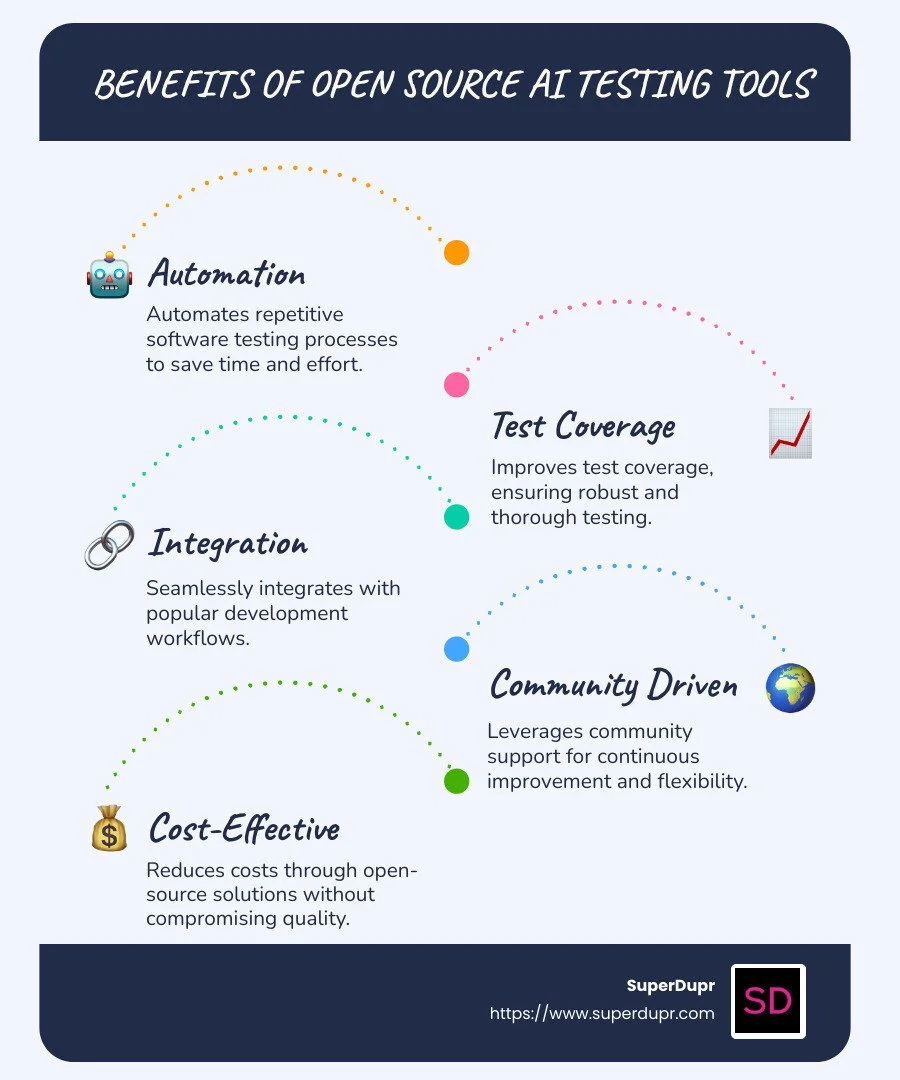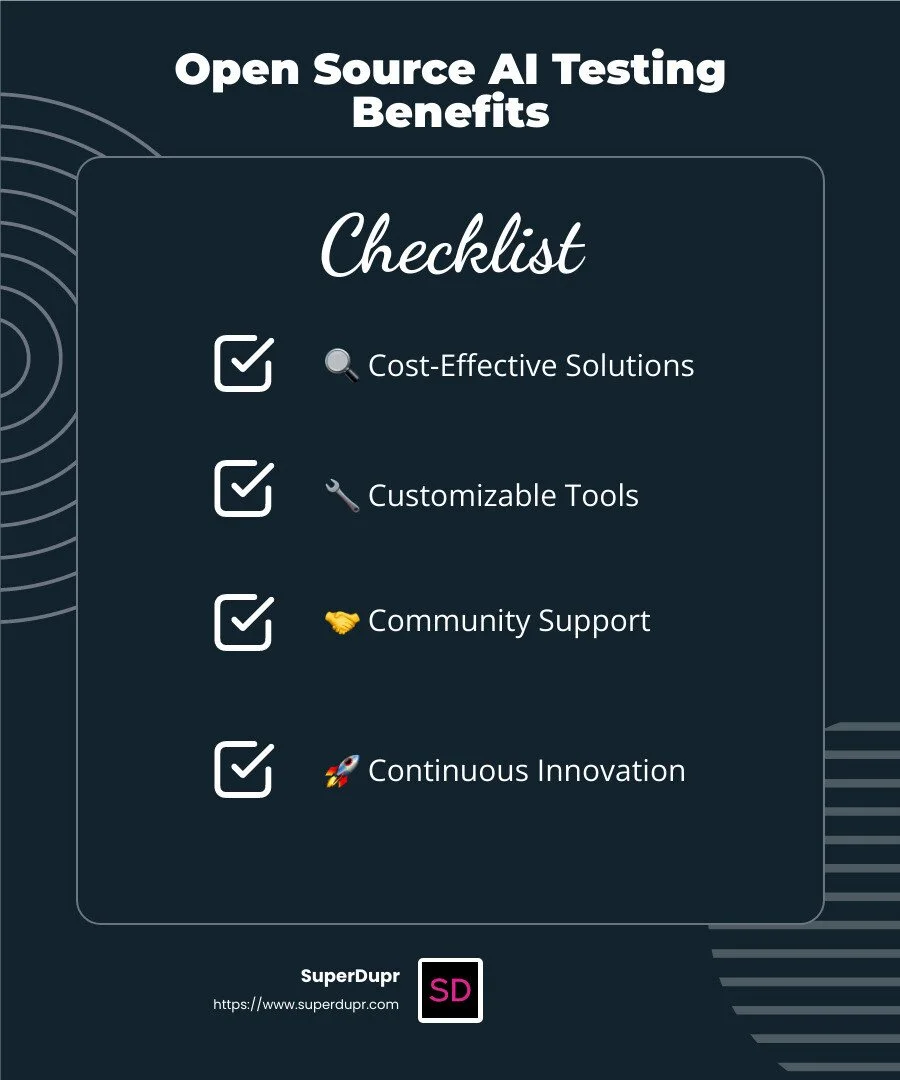Open Source AI Tools for Testing: A Comprehensive Guide
Open source AI testing tools are reshaping the way we approach software development. By combining the power of artificial intelligence with testing, these tools offer automated solutions that are not only cost-effective but also flexible and community-driven. They help developers manage complex codebases with ease, significantly reducing the time and effort traditionally needed.
Automates Software Testing Processes
Improves Test Coverage and Efficiency
Integrates with Popular Development Workflows
Reduces Manual Effort in Identifying Bugs
We’ll explore how open source AI testing tools are changing the landscape of software development and automation. These tools, ranging from Selenium to Apache JMeter, provide developers with the capabilities to ensure their software is robust, performant, and reliable.
By embracing these innovations, developers can focus on what truly matters—creating exceptional digital experiences.
As Justin McKelvey, an expert in digital change and open source AI testing tools, I am eager to guide you through this cutting-edge journey. My passion for innovation and robust software solutions continues to drive my exploration of how AI can improve development workflows.
Why Open Source AI Testing Tools Matter
Open source AI testing tools are revolutionizing software development by offering cost-effective and flexible solutions. They empower developers to automate testing processes without the hefty price tag associated with proprietary tools.
Cost-Effectiveness
One of the biggest advantages of open-source tools is their cost-effectiveness. These tools are free to use, which is a huge plus for startups and small businesses operating on tight budgets. By leveraging community-driven resources, companies can access top-notch testing capabilities without incurring significant costs.
Flexibility
Open-source tools offer unparalleled flexibility. Developers can customize and extend these tools to fit specific project needs. This adaptability ensures that the tools can evolve alongside the software, accommodating any changes or new requirements that arise during development.
Community Support
A vibrant community supports open-source AI testing tools. This community is a treasure trove of shared knowledge, resources, and innovations. Users can find solutions to common problems, contribute to tool improvements, and stay updated on the latest advancements. This collective effort ensures continuous improvement and innovation.
For example, tools like Selenium and Appium benefit from an active user base that regularly shares insights and updates.
In summary, open source AI testing tools offer a powerful combination of cost savings, adaptability, and community-driven support. These tools not only lower the barrier to entry for high-quality software testing but also provide a dynamic platform for continuous innovation. By embracing these tools, developers can focus more on creating exceptional digital experiences and less on the logistics of testing.
Top Open Source AI Testing Tools
When it comes to open source AI testing tools, a few standout options offer a mix of versatility, ease of integration, and robust functionality. Let's explore some of the top tools that are making waves in the industry.
Selenium
Selenium is a heavyweight in web application testing. Known for its cross-platform capabilities, Selenium supports various operating systems and browsers, including Safari, Chrome, and Firefox. This makes it a go-to choice for developers looking for browser compatibility.
Selenium's power lies in its ability to integrate with different programming languages and frameworks, such as Java, Python, and Ruby. This integration feature allows for seamless collaboration in diverse development environments. Moreover, Selenium's open-source nature means it continuously evolves, thanks to a vibrant community that contributes plugins and extensions.
Appium
For those focused on mobile testing, Appium is a game-changer. It excels in testing hybrid applications and supports both Android and iOS platforms. Appium does not require the source code of the applications, which simplifies the testing process.
Its automation capabilities are extensive, allowing developers to write tests in multiple programming languages like Java, C#, or Python. Appium is built on the idea that testing native apps shouldn't require an SDK or recompilation, making it a flexible tool for mobile app developers.
Apache JMeter
Apache JMeter is indispensable for performance testing, particularly when it comes to load and stress testing. Originally designed for web applications, JMeter has expanded to test a variety of server types, including FTP, SOAP, and JDBC.
With JMeter, developers can simulate multiple users and measure application performance under different conditions. This makes it an excellent choice for functional testing as well. Its user-friendly interface and ability to integrate with CI/CD pipelines make JMeter a favorite among testers who need reliable and repeatable performance metrics.
Robot Framework
Robot Framework is a versatile tool that supports acceptance testing and robotic process automation. Its keyword-driven approach makes it accessible, even for those with minimal programming experience.
Written in Python, Robot Framework allows for easy customization and extension. It's particularly popular for Python developers who want a tool that integrates seamlessly with their existing tech stack. The framework's capability to handle both web and mobile testing makes it a comprehensive solution for diverse testing needs.
Watir
Watir (Web Application Testing in Ruby) is a simple yet powerful tool for web application testing. It leverages the Ruby programming language to offer cross-browser testing capabilities. Watir is known for its ease of use and ability to interact with a browser the same way a user would, making it highly effective for simulating real-world user interactions.
Watir's lightweight nature and ability to integrate with other tools in the Ruby ecosystem make it an attractive option for developers who prefer a straightforward approach to testing. Its community-driven development ensures that it stays relevant and up-to-date with the latest web technologies.
In summary, these open source AI testing tools provide a range of functionalities to meet different testing needs. From Selenium's browser compatibility to Appium's mobile testing prowess, each tool offers unique advantages that cater to specific aspects of software development and testing. By leveraging these tools, developers can ensure thorough and efficient testing processes, ultimately leading to more robust and reliable software products.
Benefits of Using Open Source AI Testing Tools
Open source AI testing tools come with a host of benefits that make them an attractive choice for developers and organizations alike. Let's explore some of the key advantages:
Scalability
One of the standout benefits of open source AI testing tools is their scalability. As your project grows, these tools can handle increasing complexity and larger codebases without a hitch. They integrate seamlessly with Continuous Integration/Continuous Deployment (CI/CD) systems, allowing for automated tests at every stage of development. This ensures that as your software scales, so does your testing capability, providing real-time feedback and quicker issue detection.
Continuous Improvement
Open source tools thrive on community contributions. This means they are constantly evolving, with new features and improvements being added regularly. Developers from around the globe contribute to these tools, ensuring they stay up-to-date with the latest testing methodologies and technologies. This community-driven approach not only improves the tools but also provides a wealth of resources and support for users.
Improved Test Coverage
AI-powered open source testing tools use machine learning models to automatically generate test cases, which improves test coverage. They can uncover edge cases and deeply hidden bugs that traditional testing methods might miss. With AI, these tools learn from past results, refining their approach to focus on areas with high failure rates. This intelligent error detection and optimization ensure that your tests are both comprehensive and efficient.
In conclusion, the open source AI testing tools offer a blend of scalability, continuous improvement, and improved test coverage. These advantages make them indispensable for developers aiming to deliver high-quality software efficiently. As the landscape of software testing evolves, leveraging these tools can provide a significant edge in ensuring robust and reliable applications.
Frequently Asked Questions about Open Source AI Testing Tools
What are the best open-source AI testing tools?
When it comes to open source AI testing tools, some names stand out as industry leaders. Selenium is often at the top of the list due to its versatility in web-based testing, supporting multiple browsers and platforms. It's a go-to for developers who need robust integration with various programming languages and frontend frameworks.
Appium is another popular choice, especially for mobile testing. It excels in automating tests for native, mobile web, and hybrid applications. Appium's ability to run tests on both iOS and Android platforms without recompiling apps makes it a favorite among mobile developers.
For performance testing, Apache JMeter is widely used. JMeter is designed for load and stress testing, helping measure an application's performance and acting as virtual users to send requests to servers.
How do AI testing tools work?
AI testing tools use machine learning to improve the testing process. They automatically generate test cases by analyzing historical data, code patterns, and expected outputs. This approach not only uncovers edge cases but also identifies deeply hidden bugs that might be missed with traditional methods.
These tools also employ self-learning algorithms. They learn from past test results and failures, leveraging insights to intelligently refine inputs and find critical vulnerabilities. Integration with CI/CD pipelines allows these tools to run automated tests continuously, providing real-time feedback and quicker detection of issues.
Are open-source AI testing tools suitable for all types of testing?
Yes, open-source AI testing tools are versatile and can be used for various types of testing. Web applications benefit greatly from tools like Selenium and Watir, which offer extensive cross-browser capabilities.
For mobile applications, Appium is a strong candidate, as it supports testing on both Android and iOS platforms. It’s especially useful for hybrid and native applications.
API testing is another area where these tools shine. Many, like Apache JMeter, offer robust support for functional testing and can simulate complex API interactions to ensure reliability and performance.
In short, whether it's web, mobile, or API testing, open-source AI testing tools provide comprehensive solutions that cater to a wide range of testing needs.
Conclusion
At SuperDupr, we believe in the power of AI automation to transform businesses and streamline development processes. By leveraging open source AI testing tools, we help companies scale efficiently and effectively.
These tools offer a unique blend of cost-effectiveness and flexibility. They empower businesses to adapt quickly to changing requirements without the burden of hefty licensing fees. With strong community support, they continuously improve, providing cutting-edge features and updates.
Our team at SuperDupr specializes in integrating these tools into your workflow, maximizing their potential to save you time and resources. Whether you're launching a new product or enhancing an existing one, our expertise in AI automation ensures that your business can scale smoothly and sustainably.
Explore how our services can help your business thrive by visiting our services page.
By embracing open source AI testing tools, you not only improve your testing capabilities but also position your business for long-term success in a rapidly evolving digital landscape. We are here to guide you every step of the way, ensuring that your journey towards automation and scalability is seamless and rewarding.


